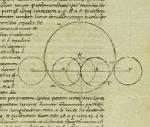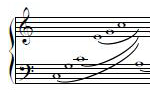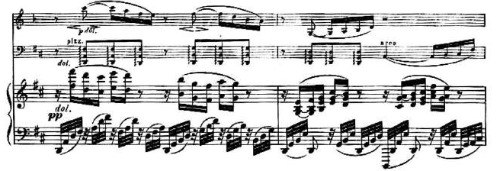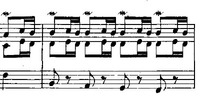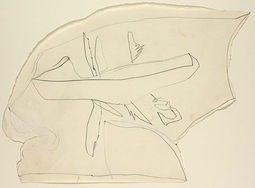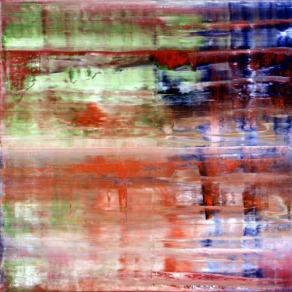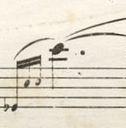We truly learn so much by reading music performance treatises; yet we make a mistake if we read them too simply. Many useful keyboard how-to-books grow from Enlightenment sensibilities: treatises penned by the keyboardists C. P. E. Bach, Daniel Gottlob Türk, Carl Czerny, Ignaz Moscheles. I'm not suggesting that these authors were practicing "esoteric writing" -- the deliberate making of paradoxes and puzzles of meaning. I'm suggesting that … [Read more...]
Ensemble
Nantes, 2015 It's the last week of January, and I'm in France for the yearly mega-festival La Folle Journée. During 5 days, 330 concerts are being presented! (I play 5.) Folle Journée is the work of many people -- especially René Martin, founder and artistic director of Folle Journée. Recently, talking with Tim Page, I realized just what significant influences the ideas of a few concert presenters, a few producers (and critics) have been on … [Read more...]
Immeasurable
If they throw stones upon the roof While you practice arpeggios, It is because they carry down the stairs A body in rags. Be seated at the piano. ... Wallace Stevens: "Mozart, 1935" I ask many young pianists to play un-measured preludes by French composers Louis Couperin, Gaspard Le Roux, or Rameau. These are written pieces in which pitches are specified but rhythm is not. I offer no instruction, no advice. Louis Couperin: Prelude You … [Read more...]
Unhinged
C. P. E. Bach writes in his treatise: "A musician cannot move others unless he too is moved. He must of necessity feel all of the affects that he hopes to arouse in his audience, for the revealing of his own humor will stimulate a like humor in the listener. In languishing, sad passages, the performer must languish and grow sad. Thus will the expression of the piece be more clearly perceived by the listeners...." It's an old and ongoing … [Read more...]
Sic transit pianisti
I return to Rotterdam, and it's as if no time has passed. Four years ago, I left very early in the morning, down a street with wood planks instead of a sidewalk. The construction is long finished, but I return to the thrill of that morning. It was October then too. I did a 2-day seminar in Rotterdam, at Codarts. Following that, something slightly crazy was on my schedule. I'd agreed to play, with several other pianists (Robert Levin, … [Read more...]
Voice Mis-Leading
Some solo piano music has part-writing that seems to correspond directly to music for string quartet. In such keyboard music, there are a constant number of "voices" tracing coherent individual lines. Beethoven: Opus 110 These voice-parts have integrity. We can follow tenor or bass, alto or soprano (viola or cello, second violin or first violin). This is a modern practice in keyboard music, I believe. The earliest keyboard pieces -- … [Read more...]
Departure
In J. S. Bach's Capriccio, BWV 992 I noticed strongly emotional content in an unusually repetitious passage -- a place where as the keyboardist's right hand stays in place repeating a simple figure the left hand incrementally departs physically, signifying departure, descending step by step lower and lower. Something similar occurs in Schubert's G-flat-Major Impromptu: … [Read more...]
Overwhelmed
There it is. Suddenly without warning. In the midst of hearing a performance of J. S. Bach's D-sharp Minor Fugue, I'm swept by a wave of emotion. Tears come. It's not quite because of the playing -- good, but not a lot more -- though this playing is the vehicle for the transmission of whatever it is that affects me. This bottled time, this music, this careful script of actions that lead to experience... Is this feeling I have, regret for what … [Read more...]
Bachtrauma
Gerhard Richter: Bach (1992) In my dream, J. S. Bach arrives to play on the clavier some of the pieces he's written down, but as he plays, the strangeness of the temperament and lowness of pitch, the flexibility of beat and rhythmic declamation yields some of the things he plays unrecognized, for moments, or even a long while. This music that we own, this familiar canon, under his fingers it is so strange, so far from the received … [Read more...]
Roll
Some elaborate preparations to long notes in piano music are attempts to mimic the ways singers can begin a sound. The many shadings and extensions of initial consonants may get translated into piano music as multiple short notes, usually notated in small print. Though often marked with a slur, this kind of writing can still be confusing. The articulateness of the keyboard is certainly what's not wanted -- these are compound sounds. I … [Read more...]

